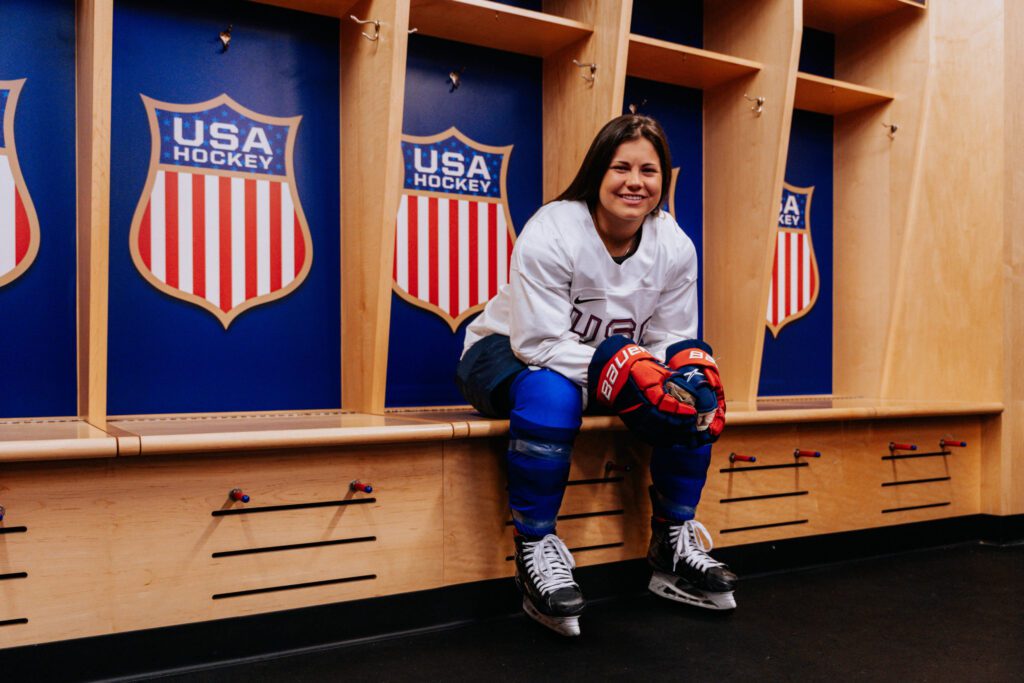It’s an afternoon in June right around two months before her next competition. Abby Roque is back at her home following a trip to her hometown a month prior where she spent a few days visiting family and friends while also doing an event or two. She’s been on an incredible path that her hockey ability has set for her since she first put stick to ice, and there is plenty of cause for celebration right now.
She’s almost like the prodigal daughter when she returns, and the town is alive when she does. There’s always a new feat, a new plateau that she’s come to, and a heap of stories and adulation to accompany them. She’s coming home with a silver medal from the 2022 Beijing Olympic Games earned a few months back.
Abby (Ojibwe of the Wahnapitae First Nation) is the first Indigenous player to be named to the USA Women’s Hockey Team. Ever. Whatever she does now will be a first at this level. The story for this trip is that she broke through a glass ceiling.
Coming back with the medal makes Roque the most famous person from Sault Ste. Marie, Mich., at the moment. So famous that she was given the key to the city, which put her in some lofty company.
“I’m the third person to get the key to the city,” Roque says when asked about the key. “We did an event where kids could see me and talk to me, and I didn’t understand there was going to be a whole ceremony before. The two other people that got the key to the city were a guy from KISS and Jeff Blashill, the former coach of the Detroit Red Wings.
“I don’t know if I quite fit in here, but I’ll take it.”

As much as she may think she’s not important enough to warrant a key, there’s plenty to suggest she’s the most inspiring of the three. She’s now in the very rarified space of trailblazer. That’s something most athletes never even think about.
Quite frankly, Abby didn’t either.
Growing up in the oldest city in Michigan, a small town directly south of the border from its Canadian twin city with the same name, Roque was immersed in her Indigenous culture from birth. She, like many of her friends, is Ojibwe of the Wahnapitae First Nation. With a large Native American population in the town, her culture could be seen and heard everywhere and was celebrated daily.
“My tribe is from outside of Sudbury, Ont., so there were two tribes 30 minutes from where my house was. And I always thought it was a common thing,” Roque says. “I’d go to school and every assembly we’d have a drum circle to start it off. I’d go to the rink that was owned by the reservation, and you’d go to pow wows there. It was such a common thing to be surrounded by other Indigenous people there that I didn’t think twice about my own roots. It was a great way to grow up.”

Roque lived around the ice before she lived to be on it. From the time she was 2 years old, her family played on a backyard rink as soon as it was cold enough every year. That’s where she and her sister learned to skate.
“Both our girls started in figure skates. (Me and my wife) both wanted our girls to skate,” says Abby’s father, Jim. “We lived in Sault Ste. Marie and everyone skated and played hockey. Just like every other kid, she wanted to be a part of the group and skate. It was actually my sister that bought her the first pair of hockey skates for Christmas a couple of years after she got into skating.”
From that point on, it was, in Abby’s words, “game over.” The older she got, the more she wanted to play.
Without many local opportunities for girls’ hockey, Abby wound up playing on boys’ teams. Playing with the guys, she quickly learned to outwit her opponents in a way that mirrored her selfless personality. She learned to score, but she took particular pride in her passing and playmaking, skills that made her stand out.
Abby’s dad was the coach of the Lake Superior State men’s hockey team until Abby finished at Sault Area High School, which meant she was always around the rink. After school, and sometimes during school, the rink served as her second home. Just like the community she grew up in off the ice, the one she found on it welcomed her like family.

After high school, Abby moved onto Wisconsin in 2016, and her world quickly turned upside down. After being around Indigenous people for most of her life, she suddenly found herself to be the only Indigenous person in the crowd.
“When I got to college, it was sad to see how little my teammates were exposed to Indigenous people or culture, but they were awesome about it,” she says. “They asked a million questions, and they were just interested. They were always really supportive.”
The transition to college life was relatively easy for Abby in just about every area except one: staying connected to her Indigenous roots. Adding to the challenge was her realization that she may not know as much of the culture as she wished she did. Being surrounded by it made it easier, but away at school, she needed to find a way to stay connected. Abby found solace in learning about her own Native American background and a new way to honor her culture.
“Obviously, I grew up around the culture a lot,” Abby says. “I think when I got (to university), my thing to be connected was to just learn. That’s when I started to research more, read different texts, and I think that’s what connected me to my roots. I think that’s what kept me grounded.”
With that mindset, Abby went on to become one of the best players to ever take the ice at Wisconsin. The forward capped her incredible college career in 2020 as the WCHA Conference Player of the Year, a First Team All-American honoree and the USCHO Player of the Year. She finished in the top 10 in Wisconsin program history for career points (ninth), assists (seventh), game-winning goals (eighth), power play goals (seventh) and plus/minus (seventh).

Abby’s college career put her firmly on the radar of the U.S. women’s national team, and after a few attempts to make the team, including a canceled IIHF Women’s World Championship in 2020 because of the COVID-19 pandemic, Abby finally made her national team debut this year at the Olympics under a bright microscope. In Beijing, she tallied two assists and had a goal in the 4-1 win over Finland for her first three points for the Red, White and Blue. As a rookie on this big stage, she played like a vet.
Being the first anything in anything usually comes with fanfare, and Abby’s experience has been no exception. She’s being celebrated by tribes across the country as the first Indigenous player on the U.S. women’s national hockey team. When she speaks at events she’s greeted by people excited about her and what she’s doing for the community.
She’s taking the moments in stride, knowing firsthand what it’s like to be on the ice and not see many — if any — people with her cultural background across the line outside of her community. She knows that she’s helping to blaze a trail for Indigenous people, and for any minority hockey players who can see themselves in her.
“If you ask any athlete where they’re more comfortable, (it’s their) discipline — I’m obviously more comfortable on the ice. When you feel that pressure there, it’s just because you want to win. Off the ice, there’s a lot of responsibility like doing interviews, doing speaking engagements, doing camps and all these different things,” Abby says. “You do want to do it because you want to be a visible role model to kids all over. I don’t think I like public speaking, but it’s something I know I have to do so that these kids see me.
“You just don’t want to disappoint people in any way. There’s definitely pressure, but it’s a great pressure to have, and it’s a responsibility I’m more than happy to do if it leads more kids to play.”
When Abby recalls an event she’s spoken at or a moment she’s interacted with kids for autographs and photos, she seems genuinely surprised that she’s worthy of their attention. She didn’t envision herself in this role, but now that she has the platform to inspire the types of communities she grew up in, she’s dedicated herself fully to the cause.
For one, Abby is working to make hockey more affordable for families like hers. When she was young, she and her teams would fundraise to help offset the sizable costs of playing hockey. She and her family welcomed countless people to their backyard rink to play, an experience that instilled selflessness and generosity in her.
For Abby, who would rather have the game-winning assist than the game-winning goal, giving back in this way would be her biggest assist to date.
As a Nike N7 ambassador, Abby’s insight and voice is a guide to celebrating the future generations and elevating the power of youth in her community. The Nike N7 Fund was created to connect Native American and Indigenous youth to become more involved in sports and has awarded more than $8 million in grants administered by the Charities Aid Foundation of America to more than 270 communities and organizations since 2009.
Currently, Abby is in Minnesota training with her Olympic teammates ahead of the IIHF World Championships in August. Six days a week, she goes through training sessions; in between, she looks forward to being on a boat and spending time with good company, just like she once did back home on Lake Superior.
At 24 years old, Abby has the aura of an ordinary person, but she also has the uncanny ability to make everyone around her better. Inspiration unlocks the door, and she’s got the key, one for everybody. That’s always cause for celebration.
Ray Bala is a contributing writer at Just Women’s Sports based in Toronto, Canada.

